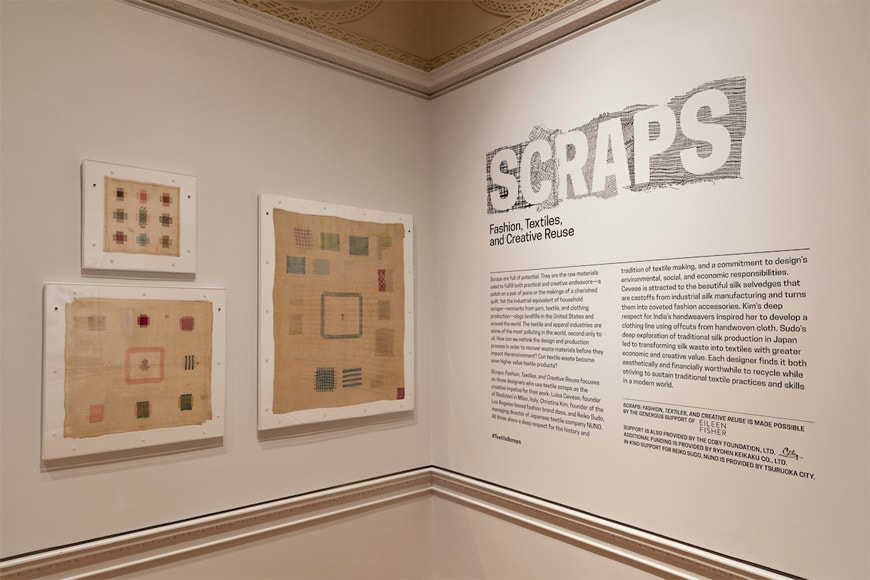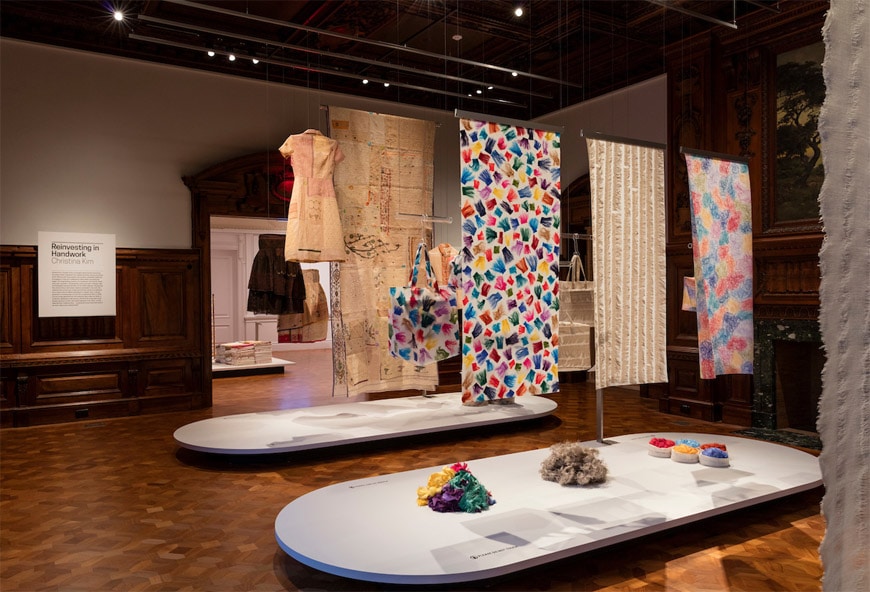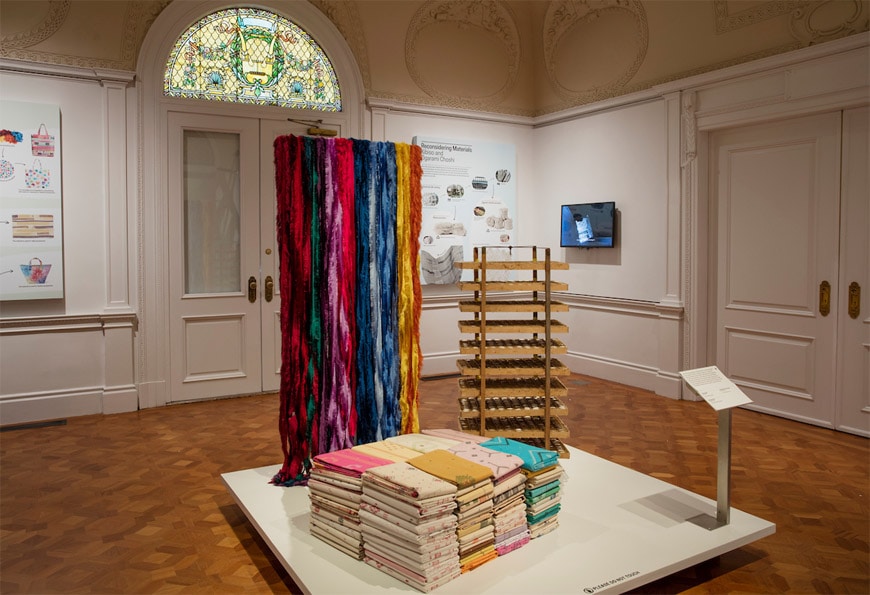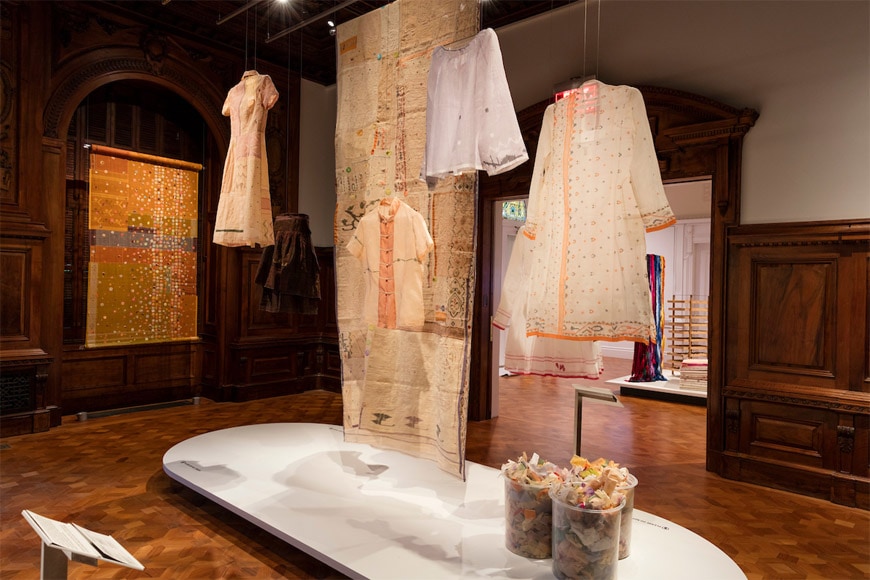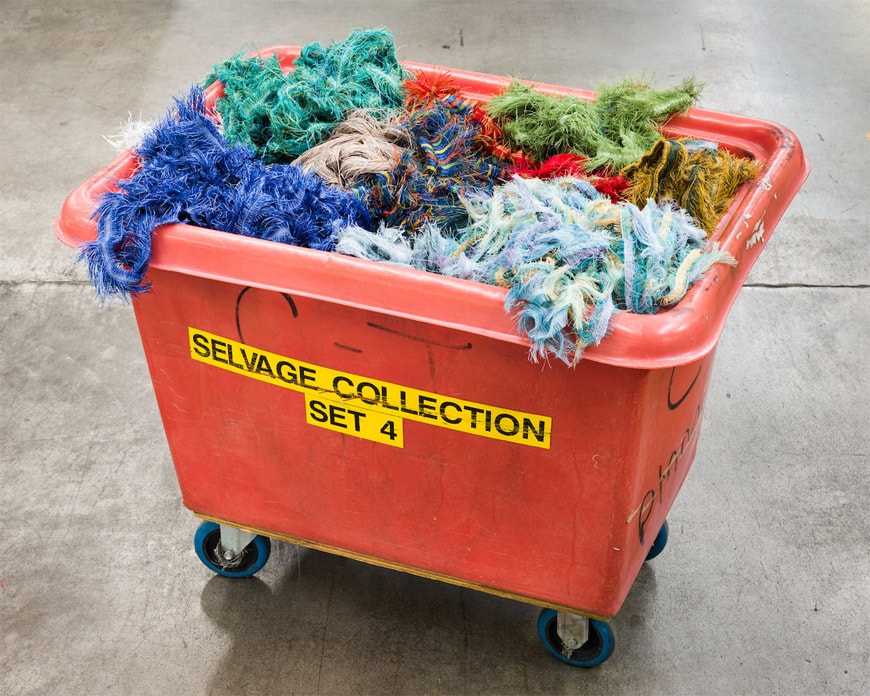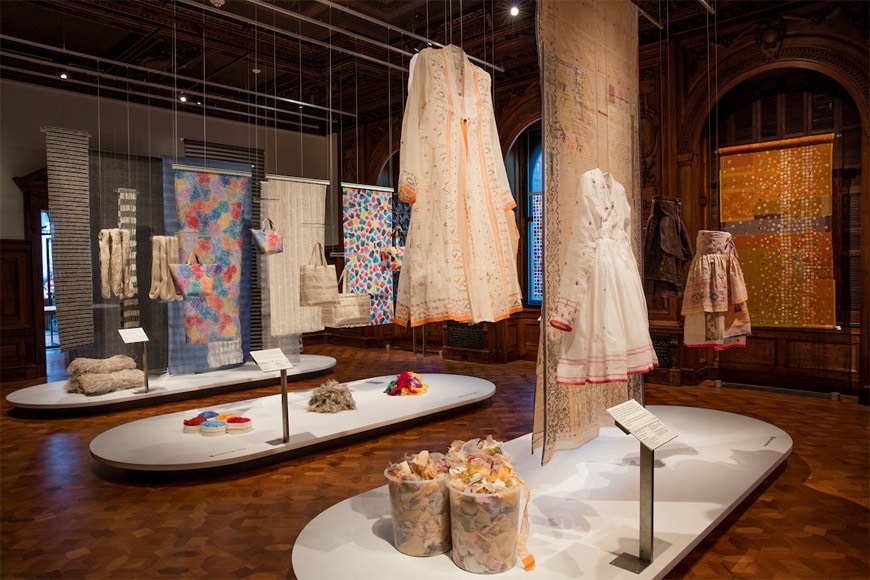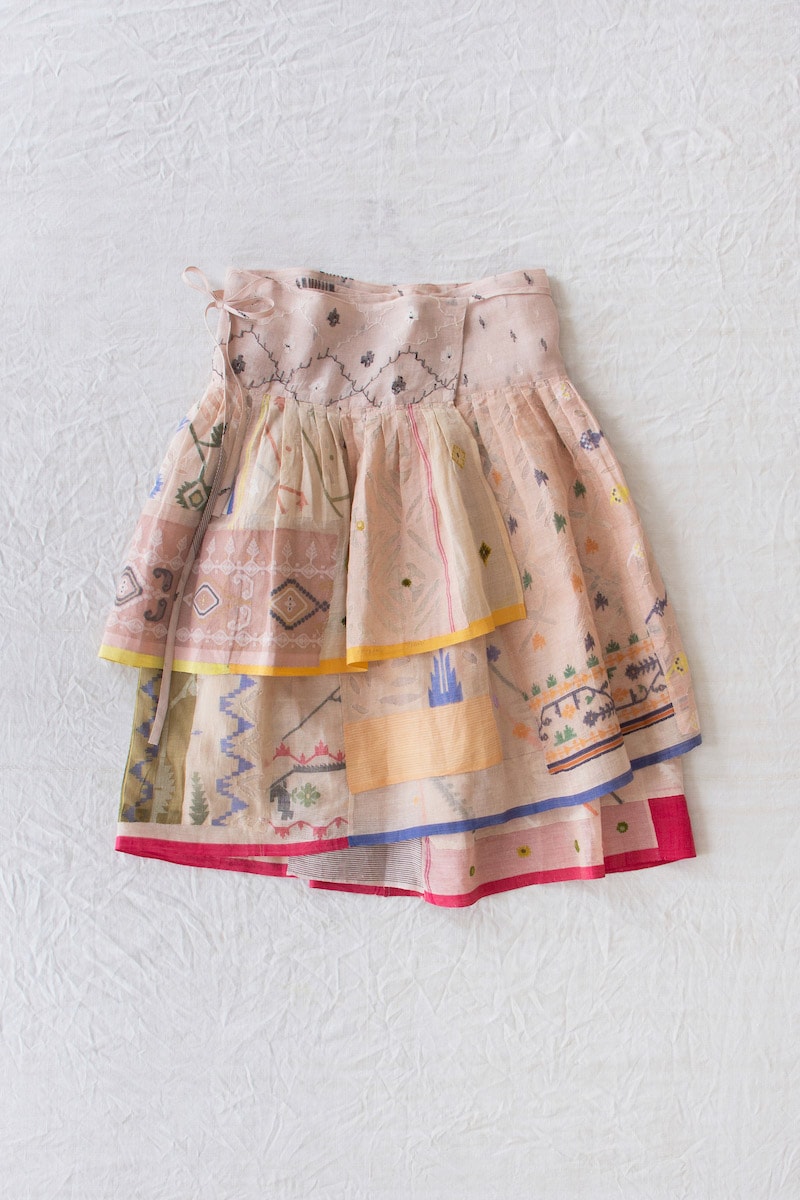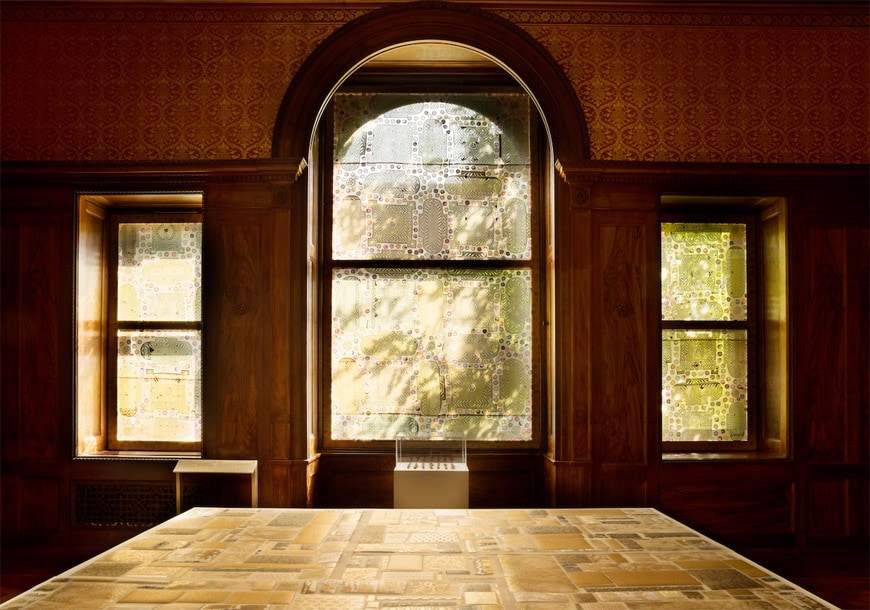Scraps: Fashion, Textiles and Creative Reuse at the Cooper Hewitt
Cooper Hewitt Smithsonian Design Museum
exhibition at the Cooper Hewitt Smithsonian Design Museum
Scraps: Fashion, Textiles, and Creative Reuse at the Cooper Hewitt Smithsonian Design Museum
Featuring creative and alternative approaches to confronting textile industry waste, “Scraps: Fashion, Textiles and Creative Reuse,” on view at the Cooper Hewitt Smithsonian Design Museum until April 16, 2017, presents the work of three designers who put sustainability at the heart of the design process.
Highlighting contemporary design that embraces the tradition of using handcraft to give new life to scraps and cast-offs, the exhibition showcases work by Luisa Cevese, founder of Milan-based design studio Riedizioni; Christina Kim, founder of Los Angeles-based brand dosa; and Reiko Sudo, cofounder of Toyko textile design firm Nuno.
Above: Installation views of “Scraps: Fashion, Textiles, and Creative Reuse.” Photo by Matt Flynn © 2016 Cooper Hewitt, Smithsonian Design Museum.
“Telling the inspiring and empowering stories of three women designers and entrepreneurs who hail from three continents, ‘Scraps’ brings critical focus to the human and environmental costs of fashion consumption while also offering viable solutions for reducing waste and raising awareness,” said Caroline Baumann, director of the museum. “Installed in the museum’s Design Process Galleries, the exhibition will be an illuminating display of design ingenuity.”
Above: Rectangular basket, 2002, textile since 2000; designed by Luisa Cevese (Italian, b. 1955), manufactured by Luisa Cevese Riedizioni (Milan, Italy); damaged and discarded overdyed fishnets, polyurethane; 8 × 14 × 7 in.
Photo: © 2016 Christopher Payne. © 2016 Christopher Payne. Courtesy of Cooper Hewitt Smithsonian Design Museum
Through more than 40 works, the exhibition explores key facets of sustainability, such as the efficient use of materials and resources, the preservation of local craft traditions, and the integration of new technologies in the recycling process. Works on view include tabletop accessories and handbags refashioned from silk selvage scraps by Cevese, appliquéd panels produced from recycled jamdani saris by Kim, and a variety of fabrics woven from kibiso, a luxury fiber Sudo developed using discarded parts of the silk cocoon. “Scraps” is organized by Matilda McQuaid, deputy director of curatorial and head of textiles, and Susan Brown, associate curator of textiles.
Above: Installation view of “Scraps: Fashion, Textiles, and Creative Reuse.” Photo by Matt Flynn © 2016 Cooper Hewitt, Smithsonian Design Museum.
DESIGNERS
Luisa Cevese reappropriates production waste to create one-of-a-kind fashion and home accessories. Her designs for Riedizioni, which she founded in 1996, are made with scraps gathered from various phases of the textile production process, which she encases in translucent polyurethane. A self-taught designer, Cevese began creating textiles for fashion and interiors in 1984, providing work for companies such as Dolce & Gabbana, Hermès, Chanel, and Comme des Garçons.
above: Luisa Cevese working on the “Spread Threads” mat.
Photo: © Luisa Cevese Riedizioni. COPYRIGHT: Cooper Hewitt
bottom: Basket bag, 2015, designed 1996. Designed by Luisa Cevese, produced by Riedizioni (Milan, Italy). COPYRIGHT:Luisa Cevese Riedizioni.
Courtesy of Cooper Hewitt Smithsonian Design Museum
Christina Kim’s fashion brand, dosa, uses a system-wide approach to reuse and recycling, including using cutting-room waste to create new products.
She draws on traditional, handcrafted, and labor-intensive textile practices around the world, particularly in India and Oaxaca, working with local artisans and engaging them in long-term collaborations. Widely recognized for her global and sustainable design practices, Kim was named by Time magazine as one of its Innovators of the Year in 2003 and received the “Innovation in Craft” Award by Aid to Artisans in 2006.
Above: Gee’s tikdi textile (detail), 2009. Designed by Christina Kim, produced by dosa inc. (Los Angeles, California).COPYRIGHT: dosa inc.
Bottom: Eungie skirt, 2008 collection. Designed by Christina Kim, produced by dosa inc. (Los Angeles, California).COPYRIGHT: dosa inc.
Courtesy of Cooper Hewitt Smithsonian Design Museum
In 1984, Reiko Sudo cofounded Nuno, a textile design firm at the forefront of innovation that combines the Japanese handcraft tradition with advanced technologies. Over the years Sudo has proposed different initiatives to reduce waste, such as recycling polyester garments and using leftover scraps to create new textiles. Nuno’s fabrics have been featured in exhibitions around the world, including the Museum of Modern Art in New York; the National Museum of Modern Art in Tokyo; the Textile Museum in Washington, D.C., and the Fowler Museum at UCLA in Los Angeles, among many others.
above: Kibiso Tsugihagi, 2016; Designed by Reiko Sudo, manufactured by NUNO Corporation (Tokyo, Japan); kibiso remnants machine-embroidered to a water-soluble base, base dissolved. Photo: Sue McNab. COPYRIGHT: Susan McNab & Nuno Corporation.
Courtesy of Cooper Hewitt Smithsonian Design Museum
Above: Textile, Itomaki Kibiso, 2009. Designed by Reiko Sudo, manufactured by Nuno Corp. (Tokyo, Japan). 100% silk (raw silk and kibiso). COPYRIGHT: Nuno Corp.
Courtesy of Cooper Hewitt Smithsonian Design Museum
Above: Installation view of “Scraps: Fashion, Textiles, and Creative Reuse.” Photo by Matt Flynn © 2016 Cooper Hewitt, Smithsonian Design Museum.
Above: Appliqué artisans laying out jamdani scraps on a base panel, Gujarat, India, 2007.
COPYRIGHT: Photo by Yoko Takahashi for Ku:nel magazine.
Courtesy of Cooper Hewitt Smithsonian Design Museum
“Scraps: Fashion, Textiles and Creative Reuse” is made possible by the of Eileen Fisher. Support is also provided by The Coby Foundation, Ltd. Additional funding is provided by Ryohin Keikaku Co., Ltd. In-kind support for Reiko Sudo, NUNO is provided by Tsuruoka City.

The Cooper Hewitt Smithsonian Design Museum in New York is the most important museum in the United States solely dedicated to design and decorative arts.
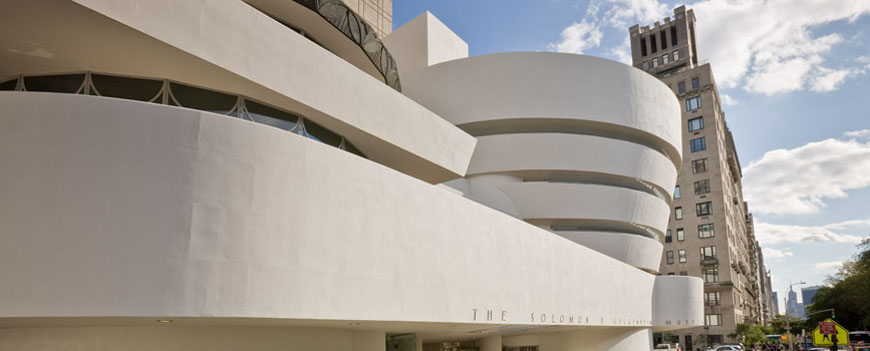
New York City
copyright Inexhibit 2025 - ISSN: 2283-5474

